June 21, 2025 | 01:34 GMT +7
June 21, 2025 | 01:34 GMT +7
Hotline: 0913.378.918
June 21, 2025 | 01:34 GMT +7
Hotline: 0913.378.918
The earthworm farming area and organic fertilizer production area are located in a garden space full of trees and miniature landscapes. Interwoven with these are bungalows, amusement parks, and lotus ponds arranged and meticulously designed to attract visitors.
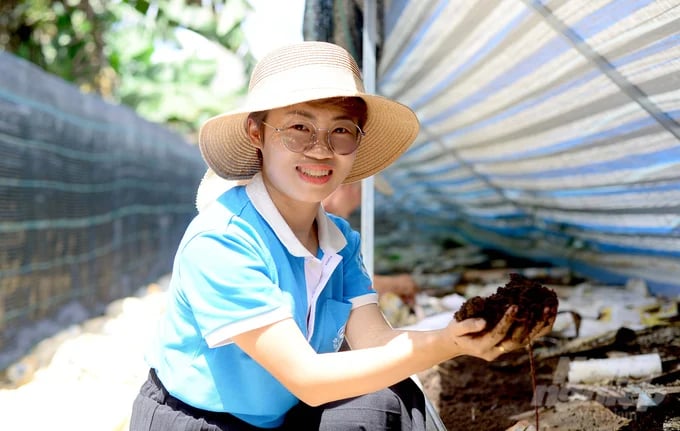
Ms. Pham Thi Thanh Tuyen, Director of Don Duong Worm Women’s Cooperative. Photo: Minh Hau.
Pham Thi Thanh Tuyen (32 years old, Director of Don Duong Worm Women’s Cooperative) shares: “Even though it is a vermicompost production area, it does not generate water or toxic emissions. From this model, we want to introduce to people and tourists the technology of treating agricultural waste to protect the environment, protect health, and implement circular agricultural production processes.”
Pham Thi Thanh Tuyen was born and raised in Quang Lap commune, Don Duong district, Lam Dong province. This commune has a tradition of producing vegetables, tubers, fruits, and industrial crops such as coffee, avocado, as well as dairy and pig farming. Generations of people grow up close to fields and gardens. Having witnessed the living environment seriously affected by agricultural by-products, Tuyen always struggled to solve this problem.
In 2018, after gathering information about the vermicompost production model in the Cu Chi district (HCMC), Tuyen visited these facilities to learn the techniques. “Back then, vermicompost production was unpopular, so when I proposed implementing the model to local people, no one supported it. Some people even sarcastically said: ‘You have so much free time in the world.” Although not many people supported Tuyen, she still invested in earthworms and experimented with vermicompost on an area of 20 square meters.
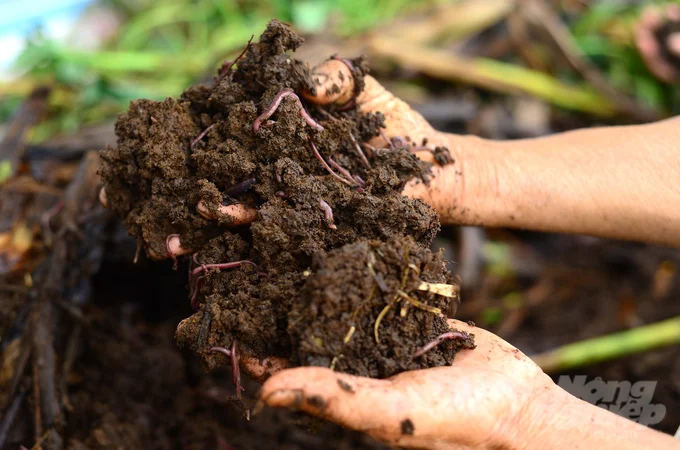
Each year, the vermicompost production model of Don Duong Worm Women’s Cooperative processes about 235 tons of cow manure, pig manure, and about 350 tons of agricultural waste. Photo: Minh Hau.
Tuyen uses cow manure and by-products such as vegetables, tubers, and fruits from her family’s garden as food for earthworms. After many months, the earthworm farming area was effective and produced the first batch of earthworm organic fertilizer. She uses this source to fertilize plants in the garden, reducing input costs in farming.
The 32-year-old girl shares: “Back then, the model was small but effective. All waste products from the family’s garden are treated cleanly and are no longer dumped to pollute the environment like before. In particular, the family saves a portion of money on fertilizer.”
From the initial success, Tuyen met with local households to analyze the effectiveness of the vermicompost model and encourage investment in production. By 2019, nine local women decided to accompany Tuyen, and the Don Duong Worm Women’s Cooperative was formed. The good news spread far and wide; to date, the Cooperative has 13 female members and built a chain of links with 21 households in the area.
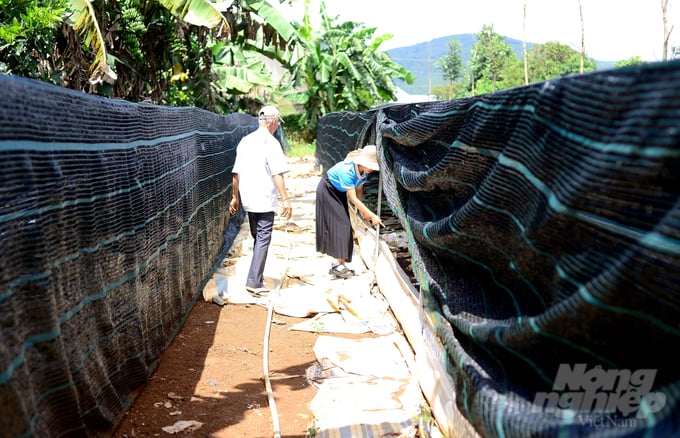
The earthworm farming area was built in the garden of an affiliated household. Photo: Minh Hau.
The scale of the earthworm farming area of the Don Duong Worm Women’s Cooperative was initially only about 400 square meters but has now been expanded to 1,500 square meters. In addition, the Cooperative also guides affiliated households to build models at home and facilitate production.
Spreading circular and organic agriculture
Currently, Don Duong Worm Women’s Cooperative is organizing the construction of a worm farming model with many different subdivisions, including farming areas, pre-processing workshops, fertilizer packaging areas, and areas for extracting worm fluids (the type used to irrigate and fertilize plants). The unit also invests in many types of modern machinery.
The cooperative builds farming plots with brick walls 0.5 - 0.8m high, 1.2 - 1.8m wide, and a roof frame system. The floor is rough-coated to ensure drainage and lined with tarpaulin.
After ensuring the farming plots, the Cooperative collects cow manure, pig manure, waste vegetables, tubers, and fruits from member households and farmer households in the area for processing. Cow and pig manure must go through mixing and microbiological treatment according to the prescribed time before being put into the worm farm.
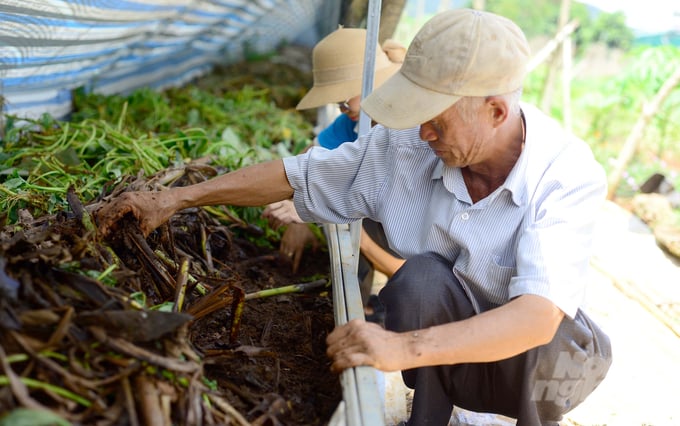
Agricultural waste products are used as food for earthworms. Photo: Minh Hau.
For earthworms to grow, the Cooperative applies both submerged and floating feeding methods. In particular, the submerged feeding process requires composting cow manure and by-products according to a time frame and controlling temperature and humidity to release worm seeds. For the floating feeding model, every week, the Cooperative organizes agricultural by-products to be placed on the surface of the farm 2 - 4 times.
After three months of farming, the Cooperative collects vermicompost at once and moves to the separation, dehumidification, and packaging stages. “Producing vermicompost is not too difficult but very beneficial. Earthworm products can be used as feed for poultry and aquaculture, and earthworm compost is very good for farming,” said Ms. Pham Thi Thanh Tuyen.
Thanh Tuyen also shares her experience in raising earthworms. It is necessary to ensure temperature, humidity, and reduce light. In particular, measures must be taken to prevent crickets, ants, snakes, etc. because these are natural enemies of earthworms.
Currently, each year, Don Duong Worm Women’s Cooperative directly processes about 235 tons of cow manure, pig manure and about 350 tons of agricultural by-products such as vegetables, tubers, and fruits of all kinds. The final product includes organic fertilizer, earthworms, and earthworm solutions. These products are partly transferred to member households of the Cooperative and associated households for agricultural production to reduce investment costs. The remainder is distributed to the market by the Cooperative.
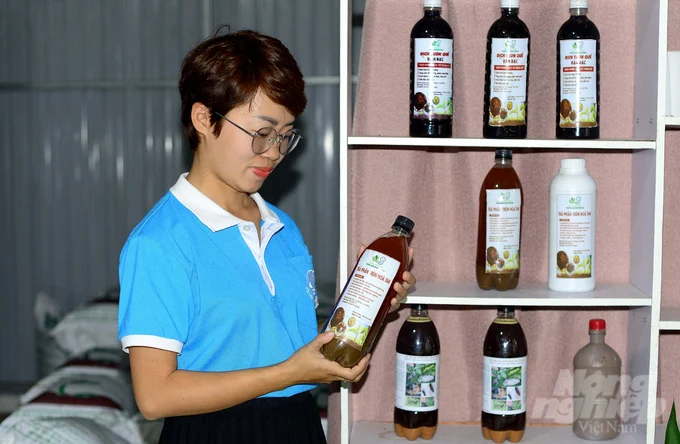
Each year, Don Duong Worm Women’s Cooperative supplies the market with 150 - 160 tons of organic fertilizer and 600 - 800 liters of earthworm solution. Photo: Minh Hau.
“The cooperative plans to further link with livestock and crop farming households in the Don Duong district to expand the model. In particular, we also want to transfer vermicompost production techniques to farmers in the area so that people can directly produce, aiming for circular and organic agriculture,” Ms. Pham Thi Thanh Tuyen shared. Along with that, the Cooperative will also cooperate with households in the area to build an agricultural-rural tourism model and promote the circular agriculture model.
Ms. Pham Thi Thanh Tuyen, Director of Don Duong Worm Women’s Cooperative, said that each year, the unit supplies the market with 150 - 160 tons of vermicompost at a price of 150,000 VND/25kg bag. The cooperative supplies about 600 - 800 liters of earthworm solution at a price of 100,000 - 150,000/liter. In addition, the cooperative supplies about 5-7 tons of worm seeds at a price of about 20,000 VND/kg.
Translated by Quynh Chi
![Turning wind and rain into action: [9] Digitizing hydrometeorological data in response to climate change](https://t.ex-cdn.com/nongnghiepmoitruong.vn/608w/files/news/2025/06/17/z6704423696987_15fd32ffc26d590d204d520c9dac6786-nongnghiep-165943.jpg)
(VAN) Farmers have begun accessing hydrometeorological applications to adjust their cropping schedules, aiming to ensure productivity and adapt to climate change.
![Turning wind and rain into action: [8] Real-time salinity detection and early warning technology](https://t.ex-cdn.com/nongnghiepmoitruong.vn/608w/files/news/2025/06/17/z6704423696987_15fd32ffc26d590d204d520c9dac6786-nongnghiep-151127.jpg)
(VAN) Thanks to the integration of modern hydrological-hydraulic models, remote sensing technologies, and artificial intelligence, the accuracy of hydrological forecasting has significantly improved.
![Turning wind and rain into action: [7] Early disaster warnings help marine farmers minimize losses](https://t.ex-cdn.com/nongnghiepmoitruong.vn/608w/files/news/2025/06/17/z6704423696987_15fd32ffc26d590d204d520c9dac6786-nongnghiep-142942.jpg)
(VAN) In recent years, thanks to early disaster warnings and forecasting, marine farmers in Khanh Hoa province have been able to reduce risks and losses, thereby improving production efficiency.
![Turning wind and rain into action: [6] ‘Four on-the-spot’ disaster management software](https://t.ex-cdn.com/nongnghiepmoitruong.vn/608w/files/news/2025/06/17/e5a48259d6a262fc3bb3-nongnghiep-183800.jpg)
(VAN) By simply activating the scenario on the disaster management software, the relevant authorities immediately know how many households need to be evacuated, where to evacuate them to, and by what means of transportation…
![Turning wind and rain into action: [5] Hue applies modern technology in disaster forecasting](https://t.ex-cdn.com/nongnghiepmoitruong.vn/608w/files/news/2025/06/17/z6704423696987_15fd32ffc26d590d204d520c9dac6786-nongnghiep-093938.jpg)
(VAN) In Hue city, modern technology has recently been applied in meteorological and hydrological forecasting and warning, helping to reduce the damage caused by natural disasters.

(VAN) A cutting-edge farming technique being implemented on an experimental ranch in Arizona's Sonoran Desert has already saved a billion gallons of water over five years, according to Civil Eats.

(VAN) Poultry and pig production and the environment can be boosted through enhanced water technology, according to new research.